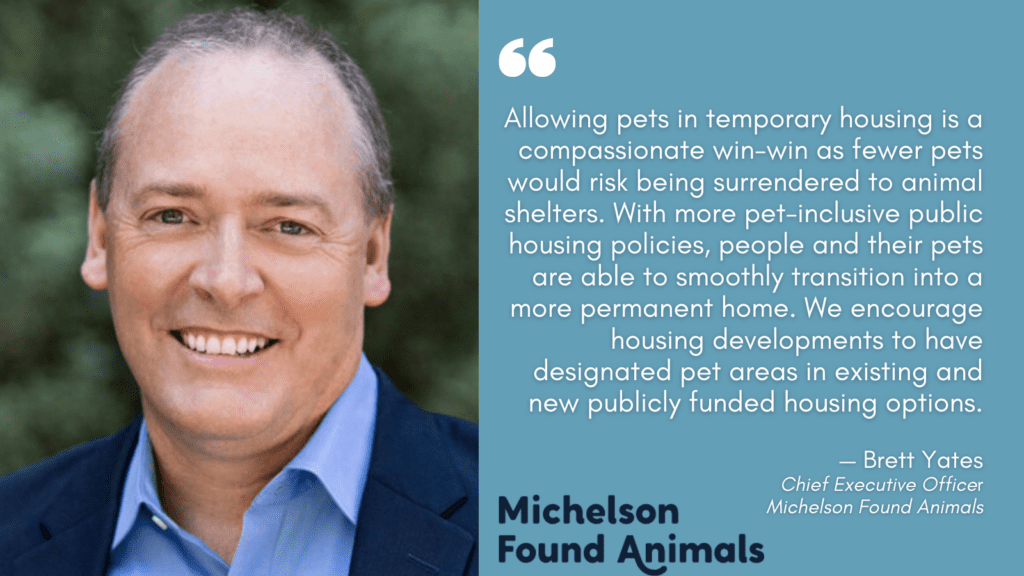Pet-Inclusive Housing a Key to Solving Homelessness – By Brett Yates, CEO of Michelson Found Animals


By Brett Yates, CEO Michelson Found Animals
Article originally published on May 11, 2023 by Capitol Weekly
As our communities grapple with the complex challenges of helping people who are unhoused or facing housing insecurity with the shelter and support services they need, we cannot ignore the impact of pet-inclusive housing policies.
Individuals who are facing housing insecurity are often forced to make the distressing decision to either give up their pets, or remain unhoused – a decision no one should ever have to make. For example, nearly half of pet-owners experiencing housing insecurity in Los Angeles reported being turned away from shelters because of restrictive pet policies, according to the Journal of Social Distress and Homelessness.
Pets are family, provide immeasurable comfort and often give their owners a sense of belonging and purpose. They are a source of companionship and emotional support. These animals are a lifeline for those going through difficult times, and provide comfort and a sense of responsibility. Pets can also serve as a layer of protection, particularly for women and children in unsafe situations.
Governor Gavin Newsom and Los Angeles Mayor Karen Bass have made it a priority to address homelessness and we commend their work on this challenging issue. As a part of solving the crisis, we must find ways for affordable and temporary housing to be pet-inclusive. Otherwise, this will continue to be yet another obstacle, forcing many unhoused individuals to continue to face the heart-wrenching choice between getting off the streets or leaving a member of their family behind.
One step towards addressing this issue is Assembly Bill 1215 by Assemblymember Wendy Carrillo (D-Los Angeles), which aims to reinstate the Pet Assistance and Support Program and offer funding to temporary shelters and domestic violence shelters to provide food and fundamental veterinary care for pets owned by those who are experiencing housing insecurity or seeking refuge from domestic violence.
Allowing pets in temporary and publicly funded housing has numerous benefits. Owning a pet can significantly improve mental and physical health by helping reduce feelings of isolation and loneliness, particularly for those who may not benefit from a robust support system, according to Granite Recovery Centers. Pets also help individuals with healthy emotional comfort, lower their blood pressure, reduce stress, and improve overall mood.
Pets are a stabilizing presence for many, and separating someone from their beloved pet not only causes more trauma, but also amplifies its effects. These policies further strain our already overburdened animal shelters.
Close to 500,000 animals are taken in by California’s public and private shelters each year, with nearly 40,000 not making it out alive, according to Best Friends Animal Society. Pets are a stabilizing presence for many, and separating someone from their beloved pet not only causes more trauma, but also amplifies its effects.
Allowing pets in temporary housing is a compassionate win-win as fewer pets would risk being surrendered to animal shelters. With more pet-inclusive public housing policies, people and their pets are able to smoothly transition into a more permanent home. As a part of pet-inclusive policies, we encourage housing developments to have designated pet areas in existing and new publicly funded housing options.
As the state works to help our unhoused population move into temporary and eventually permanent shelter, our leaders need to remember that pet-inclusive programs and policies are essential to addressing the homelessness emergency.
AB 1215 is a good start toward funding pet-inclusive programs at shelters for those experiencing homelessness. Further, we can expand on the $10 million in the State Budget to help temporary shelters become more pet friendly.
Together with a broad coalition of local organizations, we stand ready to advance creative solutions that allow all families, regardless of their housing situation, to keep their families intact and avoid further trauma. As a society, we must ensure that everyone has access to safe and stable housing and are not forced to choose between leaving their pet companions or staying unhoused.





